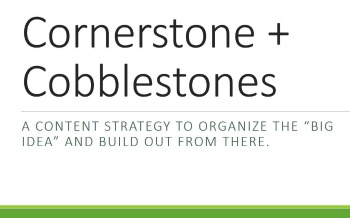Pew Research found that people are less likely to talk about controversial topics online than in person.
The latest Pew Research Internet Project poll revolved around the question of Edward Snowden’s revelations about NSA spying. It found, among other things, that “86 percent of Americans were willing to have an in-person conversation about the surveillance program, but just 42 percent of Facebook and Twitter users were willing to post about it on those platforms.”
I don’t see a problem.
I’ve written before about why business and politics don’t mix. I’ve talked about the time I deleted a tweet. I’ve written about being flamed and how sometimes you have to speak up.
There’s a difference between not picking a fight and being afraid to have a conversation, a discussion, or a debate.
The context matters.
“Spiral of silence” makes for great headlines.
Pew Research garnered a lot of them. (And, yes, I know I used it too.)
A quick Google news search for “spiral of silence” found almost 300 articles on the Pew Research poll that reference social media, groupthink, self-censorship, and how Twitter and Facebook are limiting political discourse.
This is the anti filter bubble. Where instead of talking to ourselves (the filter bubble concept where we hang out with, and are connected to, people who are like us), we find differences of opinion but choose to only talk about the weather.

There’s data–and there’s interpretation. AKA, context.
Read what the Pew Research report actually says, and there’s a lot of squishiness:
The traditional view of the spiral of silence is that people choose not to speak out for fear of isolation. Other Pew Research studies have found that it is common for social media users to be mistaken about their friends’ beliefs and to be surprised once they discover their friends’ actual views via social media. Thus, it might be the case that people do not want to disclose their minority views for fear of disappointing their friends, getting into fruitless arguments, or losing them entirely.
The report also references concerns about digital footprints and what your ideal future employer might find. It also points to the fact that people with (1) strong feelings about a topic; (2) self-perceived knowledge on the topic; and (3) a strong level of interest in the topic all factor into whether or not they would speak up.
Um… Duh?
Different channels serve different purposes.
I’m not going to litigate in 140 characters the militarization of American police forces, Middle East politics, or the implications of NSA surveillance on privacy rights.
I might post a link to a story, retweet something topical, add my 2 cents. But I can’t have that thoughtful, nuanced conversation–agreeing or disagreeing–on a soundbite platform.
Just because someone leads with the weather doesn’t mean they’re only willing to talk about the weather–or sports, movies, kids, pets, or marketing.
We’re not spiraling into silence. We’re trying to build respect and relationships, so we can have tough conversations and differences of opinion (and, occasionally, screw up too) and still like each other. We’re picking and choosing where, when, how, and with whom we want to have those deeper discussions and debates. Just as we’ve always done.
That’s my experience. What say you?
Photos by elycefeliz and infomatique (Flickr).



